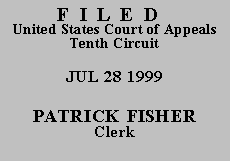

| UNITED STATES OF AMERICA, | No. 99-2064
(D.C. No. CR-98-776-SC) |
Encinas was deported from the United States in 1981, 1983, twice in 1988, and in 1993. He was previously convicted of, among other offenses, kidnaping and aggravated assault in 1985 and of delivery of marijuana in 1988.
On July 1, 1998, Encinas once again attempted to enter the United States. He drove a car to the Columbus, New Mexico, Port of Entry, and claimed, falsely, that he was a United States citizen. An INS inspector referred him to a secondary checkpoint, where he admitted that he was not a United States citizen. After computer inquiry revealed previous deportations in November 1988 and February 1993, as well as two prior felony convictions, Encinas was charged by information with attempt to reenter the United States after a prior deportation. Encinas pled guilty to the charge in the information.
Following preparation of a Presentence Report ("PSR"), Encinas objected, arguing that his offense level should be reduced by three pursuant to U.S.S.G. § 2X1.1(b)(1), on the grounds that he did not complete nor was about to complete all the acts necessary for successful completion of the attempted crime. The district court rejected this argument, and declined to grant a reduction under U.S.S.G. § 2X1.1(b)(1). Encinas now appeals, claiming the district court erred in refusing to deny the reduction.
We review a district court's application and legal interpretation of the Sentencing Guidelines de novo, but we review the court's factual findings for clear error. See United States v. Bolden, 132 F.3d 1353, 1355 (10th Cir. 1997), cert. denied, 118 S.Ct. 1686 (1998).
U.S.S.G. § 2X1.1(b)(1) provides:
If an attempt, decrease by 3 levels, unless the defendant completed all the acts the defendant believed necessary for successful completion of the substantive offense or the circumstances demonstrate that the defendant was about to complete all such acts but for apprehension or interruption by some similar event beyond the defendant's control.
Encinas argues that because lawful entry into the United States occurs only after inspection and authorization by an immigration inspector, see 8 U.S.C. § 1101(a)(13)(A), he could not complete all the acts necessary for the substantive crime--reentry--until becoming free from official restraint. We disagree. Had the inspector believed Encinas's statement of United States citizenship, he would have been admitted to the United States. Encinas fails to show what additional acts on his part, beyond his false assertion of United States citizenship, were necessary to complete the substantive offense of reentry. Rather, successful completion of the substantive offense was defeated only by the actions of INS inspectors. Encinas's argument that there must be a "positive act" of intercession by law enforcement, Appellant's Reply Br. at 3, rather than a mere refusal to admit, is irrelevant. Because Encinas "completed all the acts . . . necessary for successful completion of the substantive offense," U.S.S.G. § 2X1.1(b)(1), the three-level reduction for attempt offenses not substantially completed is inappropriate. See United States v. Chapdelaine, 989 F.2d 28, 36 (1st Cir. 1993) ("It is the nearness of the crime to achievement--not the precise nature of the involuntary interruption--that defeats the reduction available for conspiracies and attempts that have not progressed very far.") Therefore, the district court did not err in denying a three-level reduction under § 2X1.1(b)(1).
AFFIRMED.
The mandate shall issue forthwith.
ENTERED FOR THE COURT
Carlos F. Lucero
Circuit Judge
*.The case is unanimously ordered submitted without oral argument pursuant to Fed. R. App. P. 34(a)(2) and 10th Cir. R. 34.1(G). This order and judgment is not binding precedent, except under the doctrines of law of the case, res judicata, and collateral estoppel. The court generally disfavors the citation of orders and judgments; nevertheless, an order and judgment may be cited under the terms and conditions of 10th Cir. R. 36.3.
1.8 U.S.C. § 1326(a) provides that any alien who enters, attempts to enter, or is found in the United States following denial of admission, exclusion, deportation, removal, or departure while an order of exclusion, deportation, or removal is outstanding, shall be subject to imprisonment or fine. Subsection b provides for increased criminal penalties for certain removed aliens.